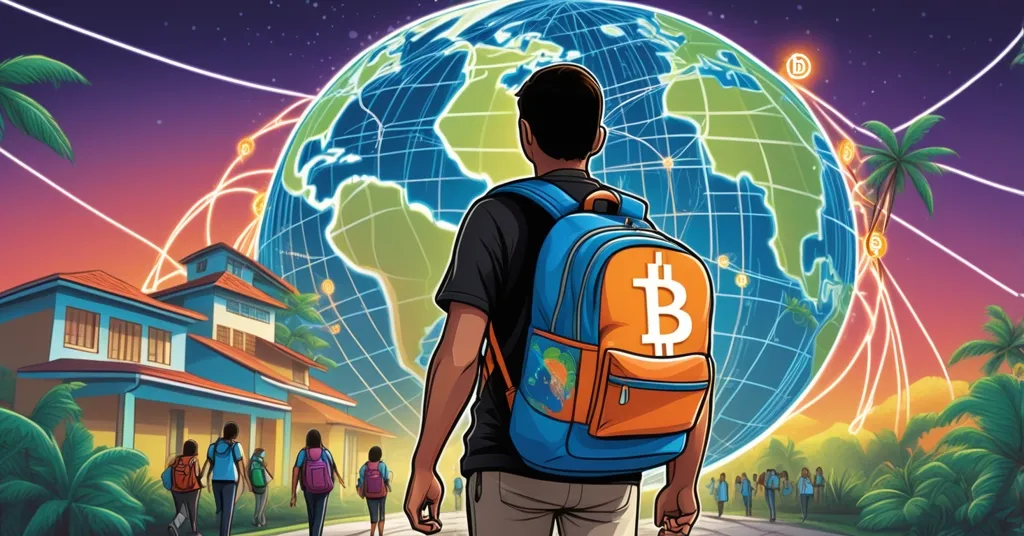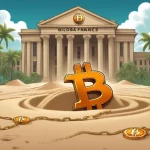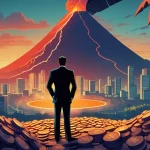My First Bitcoin Exits El Salvador as IMF Bailout Shifts Crypto Policy

My First Bitcoin Closes Local Chapter in El Salvador Amid Policy Shifts and Global Ambitions
El Salvador’s journey as a trailblazer in Bitcoin adoption has hit a significant turning point with My First Bitcoin, a key educational initiative, ending its local operations. This closure reflects not only a strategic pivot for the nonprofit but also the broader challenges facing the country’s cryptocurrency experiment under international financial scrutiny.
- Local Shutdown: My First Bitcoin terminates in-country operations and its partnership with El Salvador’s Ministry of Education.
- Global Vision: The organization shifts to supporting Bitcoin education worldwide, moving beyond El Salvador.
- Policy Backtrack: El Salvador scales down Bitcoin initiatives following a $1.4 billion IMF bailout in December 2024.
El Salvador’s Bitcoin Dream: A Brief History
Back in 2021, El Salvador made history under President Nayib Bukele by becoming the first nation to adopt Bitcoin as legal tender. The move was pitched as a game-changer for financial inclusion, targeting a population where many lack access to traditional banking. The vision was bold: position the country as a hub for crypto innovation, attract global investment, and empower citizens with a new form of money. Bitcoin, for those new to the space, is a decentralized digital currency running on a peer-to-peer network known as the blockchain—a transparent, immutable ledger not controlled by any bank or government. Imagine sending money to a relative abroad without a bank skimming off the top; that’s the kind of freedom Bitcoin promises through its tech.
Public sentiment at the time was a mixed bag. While some Salvadorans embraced the potential for remittances and escaping inflationary fiat, others grappled with volatility and tech barriers. Enter My First Bitcoin, founded in 2021 to bridge this gap through education. Their mission was clear: ensure the average citizen, especially the youth, understood this financial revolution. Their work became a cornerstone of El Salvador’s crypto push, but as we’ll see, even the boldest dreams face harsh realities.
Policy Shifts and IMF Pressure
The situation took a sharp turn in December 2024 when El Salvador secured a $1.4 billion bailout from the International Monetary Fund (IMF). For context, the IMF is a global lender that steps in to stabilize struggling economies, often with strict conditions attached. In this case, the deal demanded a significant rollback of Bitcoin-related projects, reflecting the institution’s long-standing skepticism about cryptocurrency’s risks to financial stability. The IMF has historically clashed with crypto-friendly policies, not just in El Salvador but in other nations experimenting with digital assets, often citing concerns like volatility and money laundering—concerns that, to be fair, aren’t entirely baseless given Bitcoin’s wild price swings.
As part of the agreement, El Salvador committed to halting Bitcoin purchases for its national treasury. According to IMF reports, no new BTC has been acquired since the bailout, though the country’s Bitcoin Office website curiously suggests otherwise. This discrepancy raises questions about transparency and whether political posturing is at play under Bukele’s administration. Currently, El Salvador holds a substantial 6,374 BTC, valued at roughly $654.8 million as of recent market data (note that crypto prices fluctuate daily). To put that in perspective, it’s a notable reserve—about half the size of the IMF bailout itself—but its future utility is murky with policy in flux.
Further signaling retreat, in January 2025, El Salvador revised its Bitcoin law to make acceptance of the currency optional for businesses. This is a stark departure from the original mandate requiring merchants to accept BTC, undermining the “Bitcoin Beach” narrative that once dominated headlines. With the government stepping back, grassroots efforts like My First Bitcoin found the ground shifting beneath them. It’s a bitter pill: international bailouts and geopolitical chess don’t exactly scream “decentralized freedom.” It’s more like a leash than liberation, and for a movement built on disrupting the status quo, that stings.
My First Bitcoin’s Local Legacy
Before diving into their exit, let’s acknowledge the impact My First Bitcoin had on the ground. Since 2021, they’ve educated over 27,000 students, mostly public school youth aged 12-18, through free, beginner-friendly classes. Their flagship “Bitcoin Diploma” program, crafted with the Ministry of Education, wasn’t just a crash course—it covered everything from blockchain basics to practical uses like remittances and savings, empowering kids to engage with a borderless economy. One success story speaks volumes: a 16-year-old from San Salvador used BTC to send money to a cousin in the U.S., bypassing hefty fees. That’s the kind of real-world change education can spark.
For many Salvadorans, this wasn’t merely about tech—it was a glimpse into a potential paradigm shift. My First Bitcoin’s hands-on approach built trust and curiosity in communities often sidelined by financial systems. But with the government’s pivot under IMF pressure, sustaining local operations became a losing battle. Arnold Hubach, Director of Communication for the organization, confirmed that no new initiative will replace their program in El Salvador. The classroom doors are shut, leaving a void in a nation that once positioned itself as the vanguard of crypto adoption.
Global Ambitions and Challenges
Despite the local closure, My First Bitcoin isn’t throwing in the towel. Their founder, John Dennehy, has a vision that’s nothing short of audacious.
“Our ambition was always to change the world, but we had to start with a single student, then a single city, then a single nation. Now we are ready to raise the potential impact from 6 million people to 8 billion.” – John Dennehy, Founder of My First Bitcoin
Ambitious? Hell yes. But can they scale from a small Central American nation to the entire globe without losing the personal touch? My First Bitcoin is basically saying, “If one country won’t HODL the vision, we’ll take it to the whole damn world.” Their new strategy centers on supporting educators and activists globally, providing resources and curricula to spread Bitcoin literacy far beyond El Salvador. Pilot programs are already active in places like Argentina, Costa Rica, Colombia, and regions across Africa and Europe. An online learning network is also in the works, aiming to democratize access to crypto education.
Yet, let’s pump the brakes on the hype train. Scaling globally isn’t a walk in the park. Online platforms can’t fully replicate the impact of in-person teaching, especially for underserved communities where trust is built face-to-face. Then there’s the practical hurdles: language barriers, spotty internet access in developing regions, and cultural resistance to cryptocurrency. In Africa, for instance, high mobile penetration offers opportunity, but unreliable connectivity could hamstring digital learning. How My First Bitcoin plans to tackle these issues remains a critical question. Decentralized finance—or DeFi, financial systems on blockchain that cut out middlemen like banks—sounds liberating, but without tailored education, it risks being a foreign concept to many.
Critical Takeaways for the Crypto Community
El Salvador’s Bitcoin experiment stands at a crossroads, caught between visionary ideals and pragmatic constraints. My First Bitcoin’s exit is both a symptom of that tension and a testament to the adaptability of the crypto ethos. On one hand, their departure risks dimming the pioneering spirit in a nation that put Bitcoin on the global map. If education and adoption continue to wane, El Salvador could slide back into being just another cautionary tale of overreaching innovation. What happens if the $654.8 million BTC reserve becomes a political football, sold off under pressure rather than leveraged for future gains?
On the flip side, this pivot might mark a maturation for the broader movement. El Salvador couldn’t carry the Bitcoin torch alone, and spreading education globally could ignite a more resilient, grassroots understanding of cryptocurrency. Bitcoin maximalists—those who believe BTC should dominate over all other digital assets—might scoff at diluting focus, but the ecosystem thrives on diversity. Altcoins and platforms like Ethereum fill niches Bitcoin doesn’t, from smart contracts to decentralized apps. A holistic approach to education, rather than a BTC-only crusade, aligns with effective accelerationism: pushing adoption through informed, empowered communities, not blind hype.
Ultimately, Bitcoin’s core ethos—freedom, privacy, disruption—lives not in any one nation’s policy but in the minds of those who grasp its potential. My First Bitcoin’s shift to a borderless mission mirrors the currency itself: unbound by rules, even the IMF’s. Whether that translates to meaningful impact or spreads resources too thin, only time will tell. For now, we watch a local chapter close and a global one begin, with cautious optimism and a healthy dose of skepticism.
Key Questions on My First Bitcoin and El Salvador’s Bitcoin Journey
- Why did My First Bitcoin leave El Salvador?
Their exit ties to a strategic pivot toward global outreach, compounded by El Salvador’s rollback of Bitcoin initiatives under a $1.4 billion IMF bailout agreement in December 2024. - How has El Salvador’s Bitcoin policy changed recently?
Following the IMF bailout, Bitcoin acceptance became optional for businesses in January 2025, and no new BTC purchases have been made since the deal, per IMF reports, despite conflicting official signals. - What was My First Bitcoin’s impact in El Salvador?
Since 2021, they educated over 27,000 students, primarily public school youth, through free classes and a “Bitcoin Diploma” program, fostering early crypto literacy. - What are My First Bitcoin’s plans moving forward?
They’re focusing on global Bitcoin education, supporting educators worldwide, piloting programs in countries like Argentina and Colombia, and building an online learning platform. - How much Bitcoin does El Salvador hold, and what’s its value?
The national treasury holds approximately 6,374 BTC, valued at around $654.8 million based on recent market data.



